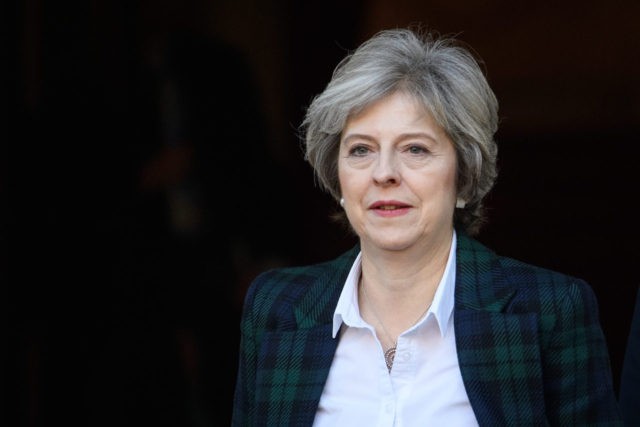LONDON (AFP) – British Prime Minister Theresa May will seek to rally her party faithful Friday after a week in which her political honeymoon abruptly ended, laying bare her weaknesses over Brexit.
The Scottish government’s call for a second independence vote has left May fighting on two fronts as she prepares to start the process of leaving the European Union later this month.
She was also forced to drop a planned tax rise after pressure from backbench MPs, revealing how she could become a hostage to factions in her Conservative Party as the complex Brexit negotiations progress.
At a party conference in Cardiff she will seek to regain the initiative, setting out plans to deliver “a brighter future” after exiting the EU.
May’s centre-right Conservatives are ahead by as much as 19 points in some polls, but much of the lead is because of a weak Labour opposition.
And her majority in the House of Commons is slim.
“Theresa May’s position as prime minister is far weaker than the opinion polls suggest,” said Tony Travers, a politics professor at the London School of Economics.
In a message released on a new website entitled “Plan for Britain”, May said last June’s referendum vote to leave the EU was “an instruction to change the way our whole country works”.
“I want the UK to emerge from this period of national change, stronger, fairer, more united and more outward-looking than ever before,” she said.
But her government’s U-turn on a tax rise in last week’s budget prompted questions over its competence.
“If the Tories can mess up a budget, how will they handle Brexit?” asked a lead article in the weekly conservative magazine The Spectator.
– ‘Pushed here and there’ –
Scottish First Minister Nicola Sturgeon appeared to catch the prime minister off-guard on Monday by calling for a new vote on independence before Brexit takes effect.
May countered on Thursday that “now is not the time” for another vote, although she did not rule out a referendum at a later date.
The move again raised the prospect of a break-up of Britain, just weeks before May triggers Article 50 of the EU’s Lisbon Treaty, the formal withdrawal process, by the end of March.
Over the next two years, May hopes to extricate Britain from 44 years of EU membership and negotiate a new trade agreement with the other 27 nations.
Inevitable compromises ahead could widen the Conservative Party’s splits over Europe — and rebels may feel emboldened by the success of this week’s budget backlash.
A small group of Tory MPs, backed by a newspaper campaign, succeeded in overturning a proposed tax rise for the self-employed.
“There’s a risk that this week may signal a beginning of a period in which May finds herself pushed here and there by groups of her own MPs, sensing that they can all get what they want,” Travers told AFP.
EU leaders, who are determined that any final Brexit deal should discourage other countries from leaving, may also take heart.
A row over misreported expenses from the Conservatives’ 2015 election campaign is another headache for the prime minister.
The Electoral Commission on Thursday issued a record fine, while three Tory MPs have reportedly been questioned by police investigating if election laws were broken.

COMMENTS
Please let us know if you're having issues with commenting.